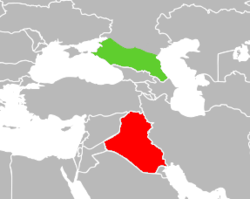 The North Caucasus (in green) and Iraq (in red). | |
| Total population | |
|---|---|
| 30,000–50,000 | |
| Regions with significant populations | |
| Baghdad, Sulaymaniyah Diyala, Kirkuk, Anbar, Najaf | |
| Languages | |
| Mainly Arabic and Kurdish as well as Adyghe, Chechen, Lezgin, Turkmen | |
| Religion | |
| Sunni Islam Shia Islam | |
| Related ethnic groups | |
| other North Caucasian peoples |
| Part of a series on the |
| Circassians Адыгэхэр |
|---|
 List of notable Circassians Circassian genocide |
| Circassian diaspora |
| Circassian tribes |
|
Surviving Destroyed or barely existing |
| Religion |
|
Religion in Circassia |
| Languages and dialects |
|
| History |
|
Show |
| Culture |
Circassians in Iraq[a] refer to people born in or residing in Iraq, that are of Circassian origin.[1] Like all Iraqis, Circassians in Iraq faced various hardships in the modern era, as Iraq suffered wars, sanctions, oppressive regimes, and civil strife.[1][2]
YouTube Encyclopedic
-
1/5Views:3 3124 6333 5142 0041 182
-
The Circassian Mamluke Sultans (Not in English)
-
Syria in Arabic Kurdish,Armenian,Syriac,Sharkes,Assyrian
-
CircassianNews.com » The Circassian Sword (Адыгэ Сэшхуэ)
-
mosques: (Kurdistan, Chechnya, Azerbaijan, Iran, Iraq)
-
IFLC Iraq KRG 2016 IBRAHIM&ASFANDIYAR&PRJA
Transcription
History
Iraqis of North Caucasus origin mainly originate from Circassia.[1] The migration of North Caucasians to Iraq goes back many centuries, peaking in the aftermath of the Russian–Circassian War with the Circassian genocide of the 1860s. The Circassians came to Iraq in two waves: directly from Circassia, and later from the Balkans. Chechens and Dagestanis also settled in Iraq throughout the Ottoman era. Circassians also settled in large numbers in other neighbouring countries including Turkey, Syria, Jordan, and Palestine.[1]
Demographics
The name "Circassian" usually denotes speakers of Northwest Caucasian languages only, however in Western Asia the name may denote North Caucasus peoples in general,[1] including Chechens and Dagestanis, who speak Northeast Caucasian languages.




The overall number of Circassians or people of North Caucasus origin in Iraq is estimated to be between 30,000 and 50,000,[3] however the total number is unknown.[1][2] It has been reported that there are 30,000 Adyghe families in Baghdad alone.[1] It is understood that many North Caucasians have ethnically assimilated into the Iraqi population, becoming Arabicized or Kurdicized.[1]
Surnames such as Al-Daghestani, Al-Shishani ("Chechen"), and Al-Sharkas ("Circassian") are common among Iraqis of North Caucasian descent.
Population
North Caucasians have settled in all parts of Iraq, from Dohuk in the north to Basrah in the south.[1] The largest communities are in Baghdad, Sulaymaniyah, Diyala, Kirkuk, and Fallujah, with smaller communities in Najaf, Hillah, Mosul, Kut, Basrah, Tikrit, Erbil, Nasiriyah, Diwaniyah, Dohuk, Ramadi, Amarah, and Tuz Khormato.[1]
There are also several Circassian villages throughout Iraq, including a neighbourhood in Baghdad.[1]
Culture
North Caucasians in Iraq have integrated into Iraqi society while preserving their traditional culture and customs, such as the Adyghe Xabze. They continue to preserve certain traditions in wedding ceremonies, birth ceremonies, and other special occasions, and to cook their traditional cuisine.[1]
In 2004, the Al-Tadamun Society of Iraqi, Chechen, Dagestani and Circassian Tribes was formed in Kirkuk. This cultural organization seeks to bring together Iraqis of North Caucasian heritage.[1] "Al-Tadamun" can be translated as "Solidarity".
North Caucasians in Iraq are predominantly Muslims like their ethnic counterparts in other countries. It is possible that a minority may also identify with Shia Islam, the majority faith in Iraq.
Language
North Caucasians in Iraq speak a number of languages, including their native languages of either Adyghe, Chechen, or Lezgin, as well as Mesopotamian Arabic, Kurdish, or Turkmen.[1] The native languages are mainly spoken by the elder generations, with younger people usually speaking only Arabic or Kurdish, the main Iraqi languages.[1]
See also
Notes
References
- ^ a b c d e f g h i j k l m n o Ahmet Katav; Bilgay Duman (November 2012). "Iraqi Circassians (Chechens, Dagestanis, Adyghes)" (PDF). ORSAM Reports (134). Archived from the original (PDF) on 3 April 2013. Retrieved 15 April 2013.
- ^ a b "Irak Çerkesleri". KAFFED. 2013. Archived from the original on 2014-05-05.
- ^ "Estimated population of Circassians". CircassianNation.org. Archived from the original on 21 April 2013. Retrieved 15 April 2013.

